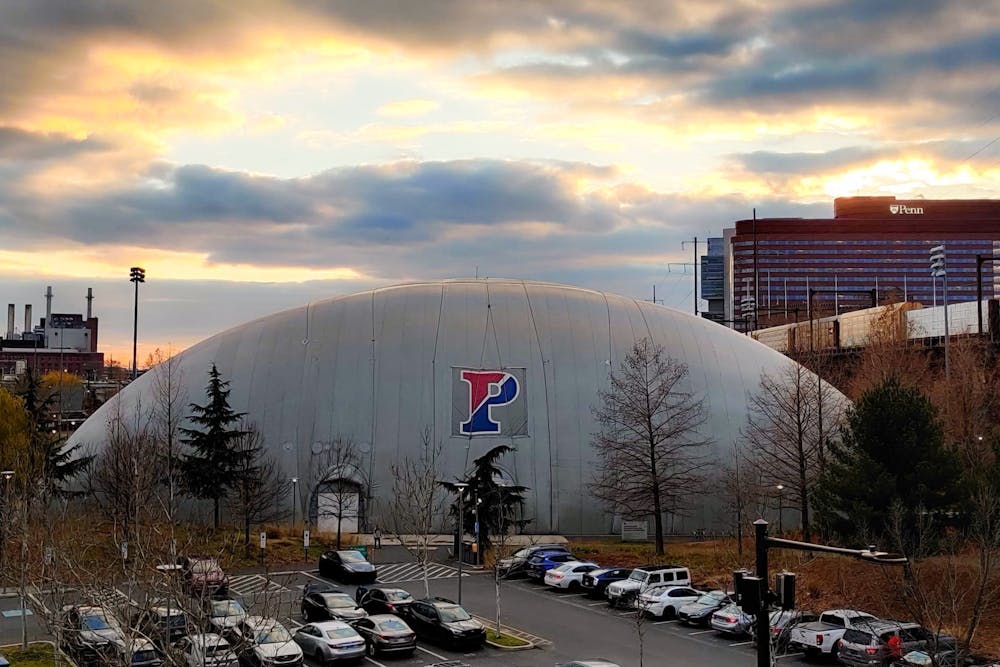As an exchange student here at Penn, I’m often asked by people here and at home about the differences between the United Kingdom and the United States. While I could get into a million minute details, my prime example is the so-called “bubble” which arches over Dunning-Cohen Champions Field at Penn Park, where I train with the Ultimate club twice a week. Penn’s capacity to put up such a structure for its students demonstrates the incredible calibre of the facilities here, the likes of which we simply don’t have in the United Kingdom. When I sent my family videos of the interior, they were astounded.
That aside, one question I’ve never been able to answer properly is what I think about living in Philadelphia. The reality, I have to tell people, is that I live at Penn, not in the city. Like the one above Dunning-Cohen, there is a similar, societal bubble which arches over Locust, cutting us off, to an extent, from the outside community. While the extent to which we’re catered for here massively simplifies our lives, the consequences of that treatment at Penn and beyond may be more far-reaching than we realise.
Coming from Edinburgh, specifically, this concept of an entirely centralised campus was a very new one to me. My university at home is spread throughout the entire city, with four campuses and classrooms, sports facilities, libraries and more dotted around in between; while you could get across the entirety of Penn’s campus in a 15-minute stroll across the length of Locust Walk, getting from one end of Edinburgh’s to the other takes about 20 minutes in a car, or 40 on the bus (which, at least, are free for students). We don’t have a university-owned housing requirement. Instead, students live in apartments alongside Edinburgh’s other residents, dotted all around the city. I never even took out a dining plan, though my cooking abilities remain questionable.
As a friend here put it to me lately, the result of this style of living, which is far more decoupled from one’s university, means that people attending university in Edinburgh and across Europe are “adults first, and students second.” Here, it feels like the reverse is true. While it exists through no fault of our own, the Penn bubble doesn’t just separate us from the outer community — it stops us from having to exist as functioning adults, too. When you think about it, all of us live within a roughly 10-block space where everything is catered for: gyms and sports facilities, supermarkets, dining halls and restaurants, bars, and even a brand-new Target on the way. And besides, if we can’t find something within those few blocks, we can always order it to the Amazon lockers by the next day.
While the convenience allows me to get so much more work done at Penn, I ultimately have to do very little for myself. I feel like a high schooler again — able to be busy all day between classes and clubs and coffee chats, yet never having any sort of need to leave the University City area and integrate into Philadelphia itself. I enjoy the comfort of campus life, but being thrust into reality (while more than slightly underprepared) in my freshman year at Edinburgh taught me so many valuable lessons about motivation and independence, whether it was learning to fix all sorts of household items when they break since I didn’t have maintenance to complain to, balancing my class schedule with a grocery run 20 minutes from home, or getting a bar job, not to bolster my LinkedIn, but because I had bills to pay. Learning how to handle yourself as an adult is a key part of the college transition and our personal development that the Penn bubble effectively stifles.
Beyond the fact that I just think it’s a shame, the fear I have is that this sheltering persists beyond our time here. When we choose careers with companies that similarly cater for our transport, meals, and even gym and spa memberships, we carry along that fundamental disconnect from the common experience that we have on campus. When I see my classmates, as I’m sure I will, in positions of power and influence some 30 years from now, I worry that the decisions they make will be formed from a superficial, rather than a truly experiential, understanding of how our neighbours from West Philadelphia and beyond live. That sense of empathy for those around us will make us better leaders and should, ideally, be instilled in us through our time living here in the city. Penn’s isolation from the outside, though, renders that much less likely to happen. That sets a worrying precedent, and one that all of us need to contend with.
The Dunning-Cohen bubble supports itself due to the air pressure within being markedly higher than the outside. This makes entering and exiting through the airlocks a relatively jarring experience — every time, my ears pop. I’ll never get used to it. This, too, is how it sometimes feels entering Penn’s societal bubble: a weird, pressurised space, totally sheltered from the winds outside. While being inside is easier — throwing a “flying disc” in a winter storm is ill-advised, after all — I always feel relieved when I step out into the crisp, evening air after practice, ear popping aside. Though I adore living here, I’m glad to be cognizant of just how strange and unlike the adult world it is. While the bubble’s all-encompassing nature makes it hard to burst while we’re in it, it’s that awareness that is the first step to outgrowing it.
ALEX BAXTER is a junior on exchange from the University of Edinburgh, studying Politics, Philosophy and Economics in the College. His email is ajgb@sas.upenn.edu.









